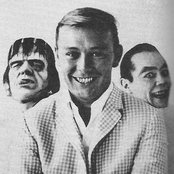by Jessica Gentile
"The Monster Mash" isn't just the most enduring song about Halloween. It may be the only song about Halloween. Sure there are plenty of pop songs with horror-themed overtones like "Thriller" or "I Put A Spell On You" as are there soundtrack classics like "Ghostbusters" or anything from Rocky Horror. But in terms songs purely about the spirit of the holiday, "The Monster Mash" is the only one that's as silly, spooky and fun as Halloween itself. It's literally a song about party monsters.
It's also the only Halloween song that's captured the cultural imagination over and over again. Unsurprisingly, it originally hit number one two weeks before Halloween in 1962. But such is the longevity of "The Mash" that it has appeared on the US Billboard charts on three separate occasions: the December following its original release, August 1970 and May 1973. Initially it didn't fare as well overseas. The BBC banned the song upon its original release in 1962 on the grounds that it was "too morbid." Don't worry, it eventually made it to No. 3 in the UK in 1973. And given Billboard's new metrics that take streaming services into account the "Mash" may just enter the charts again this year. It is indeed a graveyard smash.
But the most remarkable thing about "The
Monster Mash" is not its enduring appeal, but its creator's incredible loyalty to its gimmicky subject matter. Bobby "Boris" Pickett attempted many times to replicate the success of his first and only novelty hit prior to his death in 2007. But what is it about that original classic that has allowed it to stay in the public consciousness for over five decades, especially when all of his lesser-known, but just as monster-filled follow-ups flopped? Let's explore.
Monstrous Origins
The story of "The Monster Mash" began during a concert when aspiring actor Bobby Pickett impersonated Boris Karloff, best known for his iconic portrayal of Frankenstein, while performing a cover of the Diamonds' "Little Darlin" with his band The Cordials. This comedic interlude was such a hit with the audience that fellow band members encouraged Pickett to do more with his Karloff imitation. And so Picket, along with Leonard Capizzi, wrote "The Monster Mash." Initially the song was passed on by every major studio, until Gary S. Paxton, who previously recorded fellow novelty song "Alley Oop" agreed to produce it. Despite its gimmicky premise, it has a stronger musical pedigree than you might expect. A young Leon Russell plays piano and Darlene Love provides back-up vocals.
Inspired by "The Mashed Potato" dance craze of the time, the song tells the story of a mad scientist whose monster rises from a slab to perform a new dance, which quickly becomes "the hit of the land." With its doo-wop vibe and goofy sound effects (the sound of the cauldron bubbling was just water being slurped through a straw, the coffin closing was a rusty nail being yanked out of a board) it became an instant smash and perennial favorite.
The Failed Follow-Up Album
So how do you follow a massive hit? Well in the opinion of Bobby Pickett, with more songs about monster dance crazes! Backed by his band of Crypt-Kickers, Pickett released, The Original Monster Mash, an entire album dedicated to simply that. Perhaps you're wondering why the title includes the word "original." The word was specifically added to differentiate it from The Monster Mash, an entirely separate album by TV host and fellow horror-pop auteur John Zacherle, who had a top ten novelty hit in 1958 with "Dinner With Drac." Considering there were not one, but two full-length records dedicated to dancing monsters, the early sixties were a glorious time for fans of kitschy horror nostalgia.
The Original Monster Mash featured such forgotten gems as "Blood Bank Blues," "Monster Minuet," "The Sinister Stomp" and, of course, the "Transylvania Twist." Most of them follow in the Mash's wake by skewering silly dance fads that dominated the era. It's very much a product of its time in its choice of parody references and, naturally, doesn't all hold up well. "Rabian the Fiendage Idol" is a twisted take on 60s' teen idol Fabian — not a reference many would pick up today.
A Merry Monster Christmas
Of the fifteen other tracks on the album, only one charted. "Monster Holiday" only reached No. 30 but it was truly ahead of its time in terms of its holiday-hybrid awesomeness. Essentially the progenitor to The Nightmare Before Christmas, the song tells the story of how Frankenstein, Dracula and the rest of their ghoulish gang plan to rob Santa's sleigh. Sonically, it's essentially a retread of the Mash's melody, but with the crucial addition of sleigh bells, the lone instrumental indicator of the holiday season. Why this hasn't earned annual rotation amongst Bing Crosby and Nat King Cole's Christmas classics is truly tragic.
Pickett had another minor hit the following year in June 1963 when "Graduation Day," a rare outlier in a career filled with monster-pop, hit Number 80. The song is a modest maudlin ballad about moving on from high school, which perhaps is just as scary as Frankenstein doing the twist. But two years later Bobby was back to what he did best, or at least most successfully, releasing the "Werewolf Watusi" and "Monster Swim." His performance of "Monster Swim" on American Bandstand is notable if only for the blob-like swamp creature that accompanies him on stage.
Monster Rap: The 70s and Beyond
So many times one-hit wonders are erroneously pigeonholed. Sir Mix-A-Lot rapped about more than just butts and Chumbawumba sang about more than pissing the night away. But in the case of Bobby "Boris" Pickett it would be accurate to say he pretty much only sang about kitschy horror, clinging to the campy persona that made him famous in the first place.
As the 60s ended, Pickett remained just as loyal to
monster-themed songs as ever, adapting subjects to whatever musical style was in vogue at the moment. In the early seventies that meant groovy psych-rock, so he wrote "Monster Concert" a song that envisions a ghoulish Woodstock-like event. And in the mid-eighties that meant rap. Yes, in "Monster Rap" Frankenstein learns to talk through rhyme. As you might expect, they're equal parts charming and cringeworthy. In the nineties, he even went so far as to write a musical I'm Sorry The Bridge Is Out, You'll Have To Stay The Night, which became a straight-to-video movie retitled, Monster Mash: The Movie. That Pickett and his collaborators were able to create goofy horror songs in so many genres is a testament to his allegiance to the kitsch that made him famous. Rarely has a songwriter been so eager to embrace the gimmick of their one hit, instead of feeling stifled by it. Even among novelty artists, Pickett remains an anomaly.
It's also worth noting that Pickett also embraced other sci-fi and horror tropes too. He even wrote a relatively successful Star Trek parody song, "Star Drek" which gained cult classic status among fans on Dr. Demento's novelty radio show throughout the seventies. He also dedicated a song to another infamous movie monster with "King Kong (Your Song)" in 1976.
Even into the 2000s he re-wrote the
Mash to voice discontent with George W. Bush. While "The Climate Mash" is a humorous take on the Bush administration's indifference to global warming and environmental issues, it also serves that Pickett could find a way to remain relevant, even if no one but a loyal cult fan-base cared. While Pickett died in 2007, he remained inextricably tied to his campy songs and persona, nobly embracing his graveyard smash to the moment he entered his grave.
Here's a playlist of our favorite Bobby "Boris" Pickett songs, as well as other classic monster tunes of the era.
Follow Last.fm elsewhere:
Facebook | Twitter | YouTube | Instagram | Spotify | Soundcloud |Flickr


